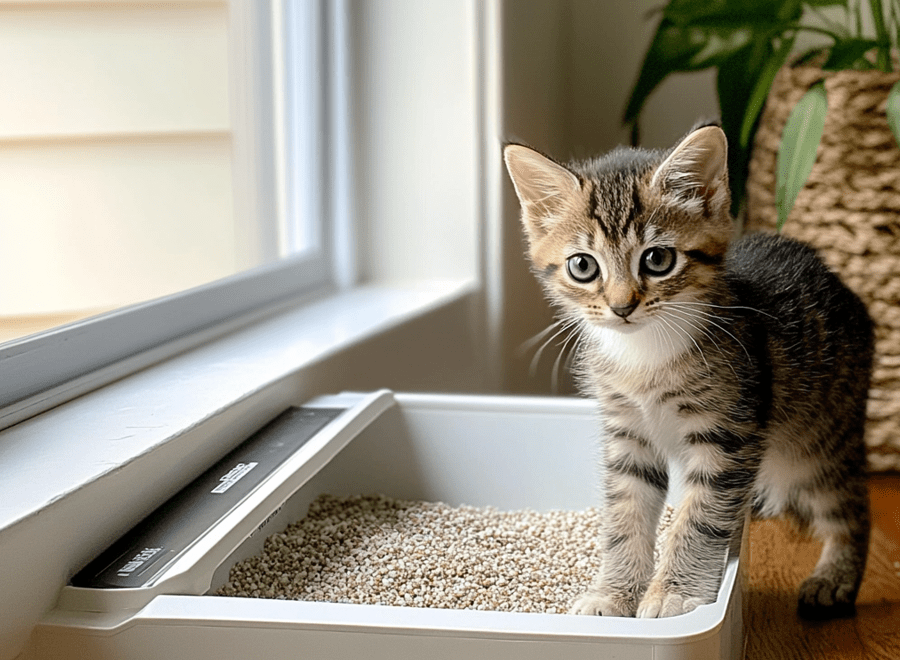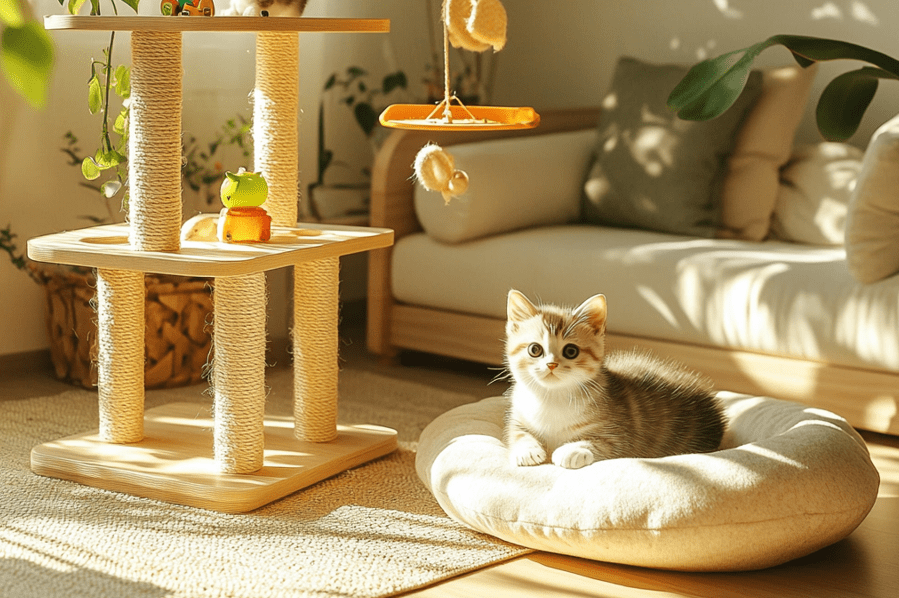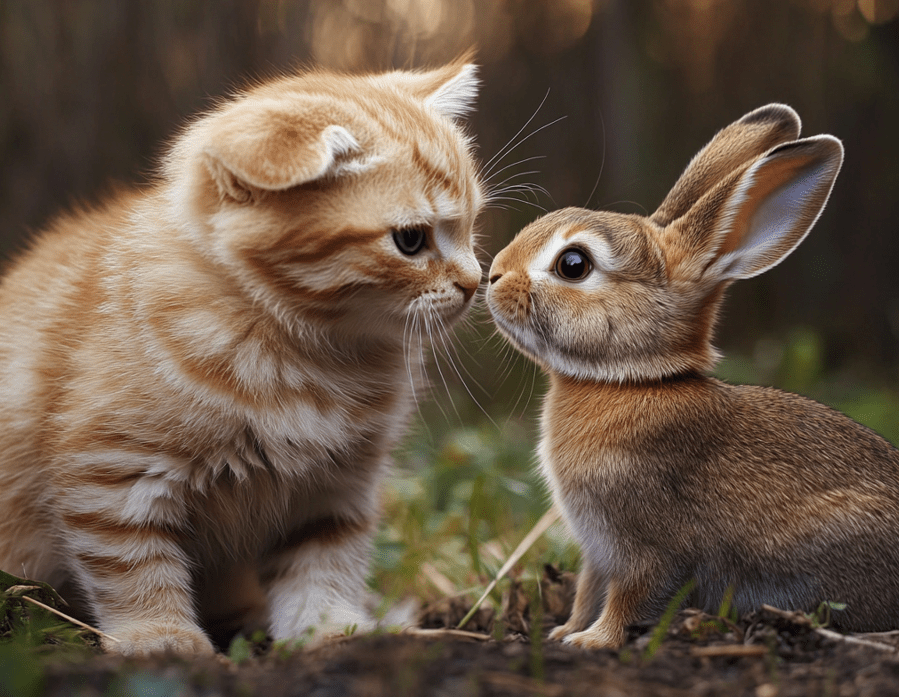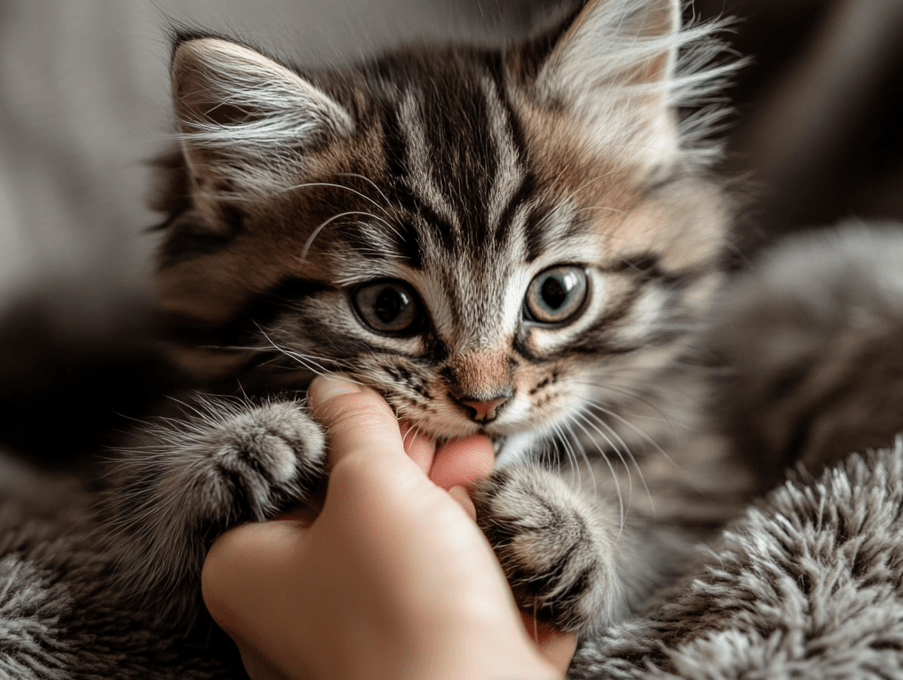
Has your sweet little kitten ever gotten carried away during playtime and given you a surprise nibble or scratch? Young kittens often bite and scratch as a normal part of their play behavior, but it is essential to control this tendency promptly. Educating your kitten to not scratch or bite at all while they are still young ensures they will mature into a well-mannered and mild grownup feline. Setting clear boundaries now, in their formative months, will ensure fun playtime for you all down the track. This will mean you do not need to worry about getting injured and you can still continue playing with your cat, while they would have learned to control their impulses but still enjoy an active and playful life. Over time, you will build a happy, friendly and well-behaved pet and from now on he will always thank you forever with all his love.
To watch the summary of this article, just watch this video-
Why Do Kittens Bite?
Kittens often bite for play. When this behavior is not actively discouraged, kittens may maintain their practice of rough play as they grow. Biting is something they will all do as part of their natural behavior, but humans need to provide guidance in how kittens are expected to behave.
In some situations, biting or scratching can be a sign that the kitten has been unwell or in pain, or is feeling stressed. There are many possible reasons your kittens may bite.
Playfulness:
Kittens naturally bite during play. This behavior enables Hopi and her littermates to socialize with one another, learn the skills of hunting in groups, establish trust in their respective bottom lines, as well have a good time. They might imitate this behavior with humans, even bite a little too much during play.
Teething:
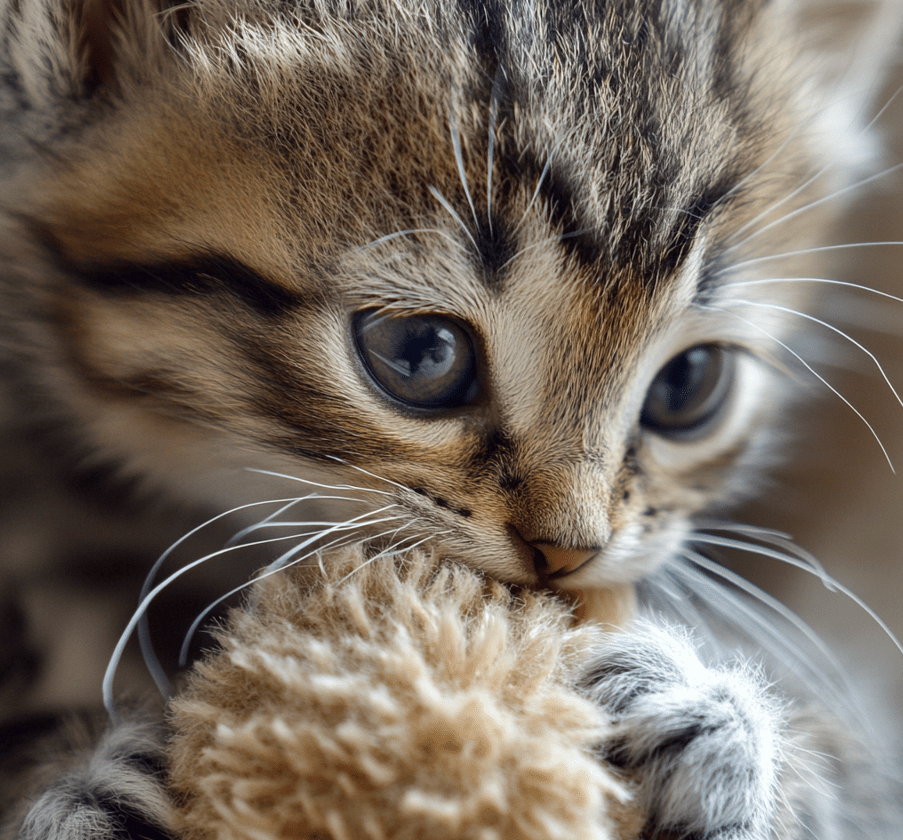
The pain from teething can cause kittens to chew on objects including other people. Kittens typically start losing their baby teeth at 3 to 4 months of age, with the milk teeth almost fully replaced by their adult set of pearly whites around 6 months.
Seeking Attention:
If your cat nips at you and then starts to meow, they are trying to get your attention. They might be indicating a specific need, like food or playtime, and end up taking you to where this request is fulfilled.
Affection:
While being petted, some kittens express their affection through soft “love bites.” They might give you a few licks first, then a gentle nip. The one thing to be cautious of is over stimulating them which could result in bites as a form of “petting aggression. This is quite common, not only in adult cats but kittens too.
Stress, Anxiety, or Fear:
Kittens that are feeling threatened or scared may bite defensively. Stress from environmental changes, like loud noises or new people/animals in the home can increase biting behavior. They might also nip if they do not like an area you are touching, in order for you to stop.
Frustration:
For example, if a kitten cannot catch that bird outside the window it might also become frustrated. This frustration may subsequently result in redirected aggression for example they bite the individual near them.
Medical Conditions:
If a kitten is ill or hurt they might bite, especially if touched in an uncomfortable area. If you see any of these signs of illness like vomiting, diarrhea or loss of appetite.
When do kittens stop biting?
Actually kittens never really quite stop biting completely. These behaviors, such as chewing and nibbling or nipping, scratching and suckling are likely to become less frequent once the puppy has stopped teething and is more looking for companionship.
This usually happens between one and two years of age when they start to mature, grow up in size and temperament. Be aware that all kittens are different and playful biting may persist into adulthood for some.
To minimize these behaviors down the line, it is important to start training, playing and socializing properly with kittens when they are still young. In this way, these biting habits probably will be less of a problem as cats mature.
How to Train a Kitten to Not Bite: A Step-by-Step Guide
Training your kitten not to bite is crucial for ensuring that they grow into a well-mannered cat. Kittens tend to bite during playtime, especially when they are teething or seeking attention. However, with consistent training and clear boundaries, you can teach your kitten not to bite. Here are effective methods to train your kitten to stop biting:
-
Redirect Their Play: Instead of allowing your kitten to bite your hands or feet, offer them a toy to bite. Always reinforce the message that toys are for play, not your body parts.
-
Positive Reinforcement: Reward your kitten when they play gently and avoid biting. This helps them associate positive behavior with good outcomes.
By following these tips, you will be able to teach your kitten not to bite and create a more enjoyable playtime for both of you.
How to Train Kittens Not to Bite: Effective Strategies
Training kittens not to bite requires patience and consistency. Start early to instill good habits, especially before they develop the habit of biting. Here are some strategies you can use to teach your kitten not to bite:
-
Use Clear Commands: Saying “no” firmly when your kitten bites will help them understand that the behavior is not acceptable.
-
Pause Playtime: If your kitten becomes too rough, immediately stop playtime and ignore them for a few minutes. This will teach them that biting results in the end of fun play.
-
Provide Alternatives: Offer toys that encourage appropriate biting behavior, like chew toys and string toys.
Incorporating these strategies into your kitten’s daily routine will make a significant difference in reducing biting behaviors.
How Do You Train a Kitten Not to Bite? Key Training Tips
When asking how to train a kitten not to bite, it’s important to focus on teaching them what is acceptable behavior during playtime. Kittens may not understand that biting hurts, so it’s up to you to guide them. Here are some practical tips:
-
Be Consistent: Every time your kitten bites, respond the same way. Consistency is key to reinforcing the lesson.
-
Socialize Your Kitten: Regular interactions with other kittens or calm adult cats can help your kitten learn bite inhibition.
By staying patient and using these techniques, your kitten will learn to stop biting and enjoy more peaceful interactions.
How to Teach Your Kitten Not to Bite: A Quick Approach
Teaching your kitten not to bite is an essential part of their early training. Whether they are playing too roughly or biting as a way of getting your attention, here are a few quick approaches you can use:
-
Stop Play Immediately: If your kitten bites during play, immediately stop all activity and walk away. This sends a clear message that biting leads to the end of fun.
-
Use Toys for Play: Always use toys to engage with your kitten. Redirect their energy to chew on something other than your hands or feet.
-
Offer Gentle Reminders: If your kitten does bite, gently say “no” and show them the proper way to play with you.
By staying consistent and patient, you’ll teach your kitten not to bite and encourage positive behavior.
How to Train Your Kitten Not to Bite: Creating Healthy Play Habits
Training your kitten not to bite is all about creating positive play habits. Here’s how you can make this part of your daily routine:
-
Interactive Play: Play with your kitten using toys that allow them to pounce and bite in a safe way. Interactive play with string toys or balls can keep your kitten’s attention off your hands and feet.
-
Encourage Calmness: After each play session, encourage calm behavior by gently petting your kitten. This reinforces that calmness is rewarded.
By training your kitten in a positive, consistent manner, they will understand that biting is not acceptable, and you will have a more well-behaved kitten.
How Do I Teach My Kitten Not to Bite? Simple Solutions
Teaching your kitten not to bite involves simple yet effective solutions. Whether they are teething or simply exploring with their mouths, these strategies will help:
-
Provide Teething Toys: When kittens are teething, they naturally want to chew. Offering them a variety of chew toys will help satisfy this urge and prevent them from biting you.
-
Timeout Method: If your kitten becomes too aggressive with biting, give them a short timeout. This allows them to calm down and understand that rough play is not acceptable.
These easy solutions will guide your kitten toward better behavior and help prevent future biting incidents.
How to Stop Kittens From Biting: Effective Training Tips
If you’re wondering how to stop kittens from biting, the answer lies in setting clear boundaries and providing ample opportunities for safe play. Here are effective training tips:
-
Encourage Bite Inhibition: Gently withdraw your hand when your kitten bites too hard, and stop playing immediately. This will teach them to control the force of their bites.
-
Reinforce Good Behavior: Praise your kitten when they play gently, rewarding them with treats or extra playtime.
These steps will help your kitten stop biting and create a more positive relationship between you and your pet.
How to Train a Kitten to Stop Biting: Proactive Methods
Training your kitten to stop biting is an ongoing process, but with proactive methods, you can make progress quickly. Here’s how to train your kitten to stop biting:
-
Use Playtime to Teach Boundaries: During play, establish clear boundaries. If your kitten starts biting, stop play immediately and offer a toy instead.
-
Redirect Negative Behavior: If your kitten starts biting, redirect their attention to a scratching post or a chew toy. This helps them learn what is appropriate to bite.
By being proactive in your training efforts, you can stop your kitten from biting and encourage good behavior.
Tips to Stop Kittens Biting and Scratching
1.Use Their Playful Energy With Toys, Not Hands
When those kittens are pouncing at your hands and feet just trying to play! They need to learn that this is a behavior they can only do with toys. If not corrected, their biting will become dangerous as they mature and can potentially cause injury.
When your kitten pounces on your ankles or nips at your hands, tell it firmly “no!” and get them focused on a toy instead. Pause play for a few moments to remind her that only toys are fair game. Do not under any circumstances use your hands or feet as play things to help drive this message home. Play with a toy, preferably one on a string or stick that is held away from your body (such as ball, feathered toy, stuffed animal).
2.Sending Them to a Scratching Post
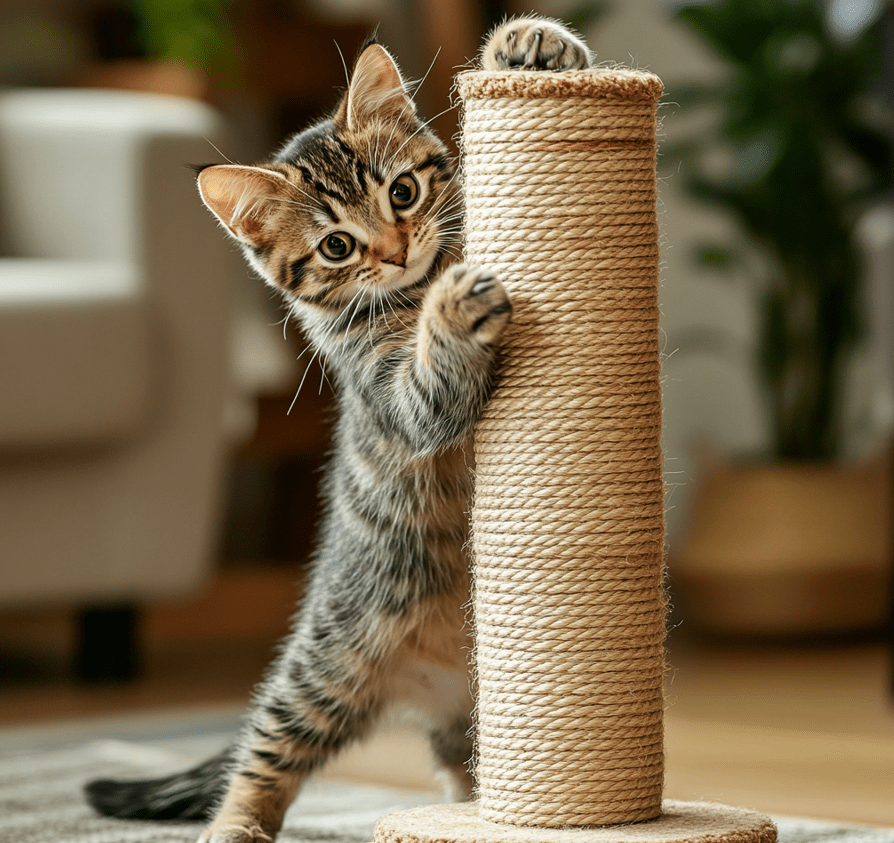
Cats are animals that scratch by nature, and they require a scratching post to stretch their claws and mark their territory. It is perfectly normal for a playful kitten to practice hunting and pouncing, during which your kitten may use their claws. If, on the other hand, your kitten is attacking you when he/she scratches you then it is important that whenever their claws are out to consistently redirect them to their scratching post or toys.
Learning to read your kitten’s body language will help you identify the point at which your kitten is about to pounce and scratch. Signs like dilated pupils, a tail sweeping back and forth and ears pinned to the head mean an attack of play is imminent.
Teaching your kitten to use the cat scratching post is important in his growing up and development phase. Make sure every single cat in the house has its own scratching post (with an extra one) to aid them in controlling clawing behavior!
3.Pause Play and Deal with Biting or Scratching Immediately
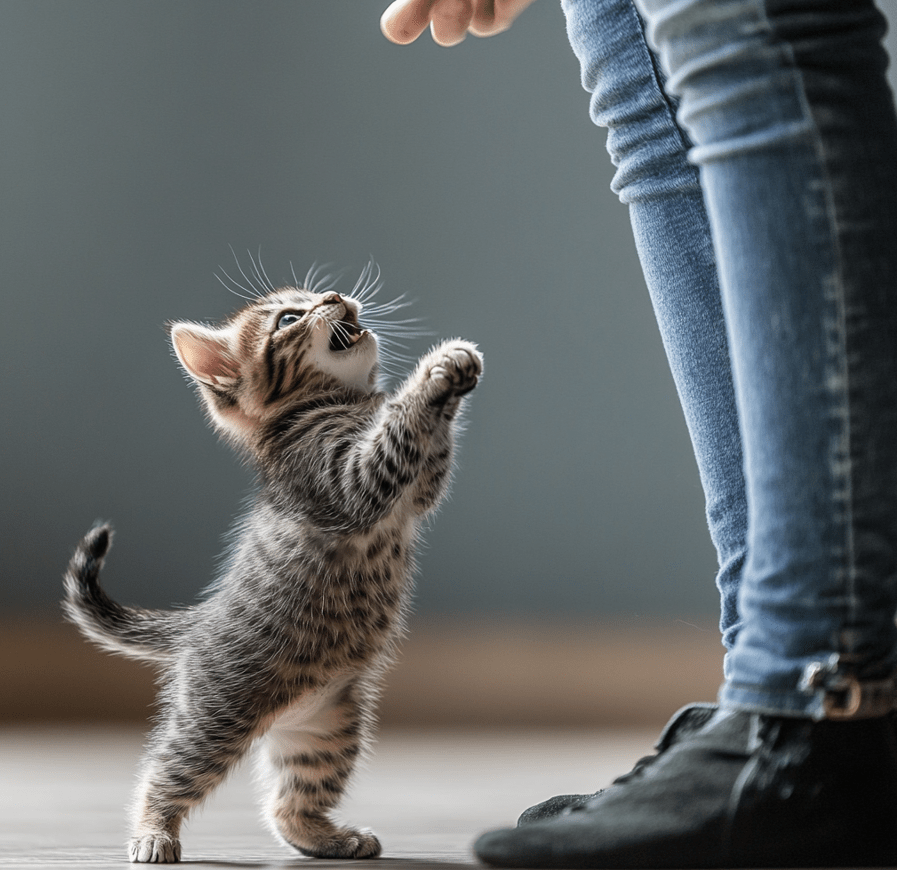
If your cat is very aggressive with what seems like frequent biting and scratching (more than an occasional nip or accidental scratch), it is important to set clear boundaries until she starts to understand that this behavior will not be acceptable.
In the event that this does happen, immediately stop any interaction or play time with your cat. Stay clear of them in order not to get hurt again, and do not provide them with attention or love.
The best method is to leave the area without acknowledging your cat at all for 5 – 10 minutes. This is not a good time to speak or make eye contact with them. This will help your cat realize that overly aggressive behavior does result in being ignored. Using this technique every time aggression appears will remind him of the lesson.
Ideally, forward these guidelines as a young cat in light of the fact that it is simpler to prepare them (kittens). This tactic is especially powerful with adult cats that love you, because they will feel your lack of attention. Please remember that cats tend to respond well to positive reinforcement so it is important for you to stay calm and patient throughout this process.
4.Utilize Your Voice
This powerful voice of yours can get down into your pets to tell them how you are feeling. Say no loudly and very firmly if it goes with biting and scratching. or “ouch!” every time your cat nips at you. Combining this vocal response with ignoring the undesirable behavior can work to establish that you are unhappy. You should ensure that you never stoop to yelling at your cat. Speak in a collected manner (your pet may not understand actual anger, and jumping emotions could make anxious or fearful traits worse than any training)
Pause for a second or two, and when you feel like it is good to go again, do not stop with using your voice as the moderator of nice behavior and light play. Praise good behavior every time, discontinue play activities when furry buddy is showing too much excitement or roughness.
5.Play With Your Kitten Every Day
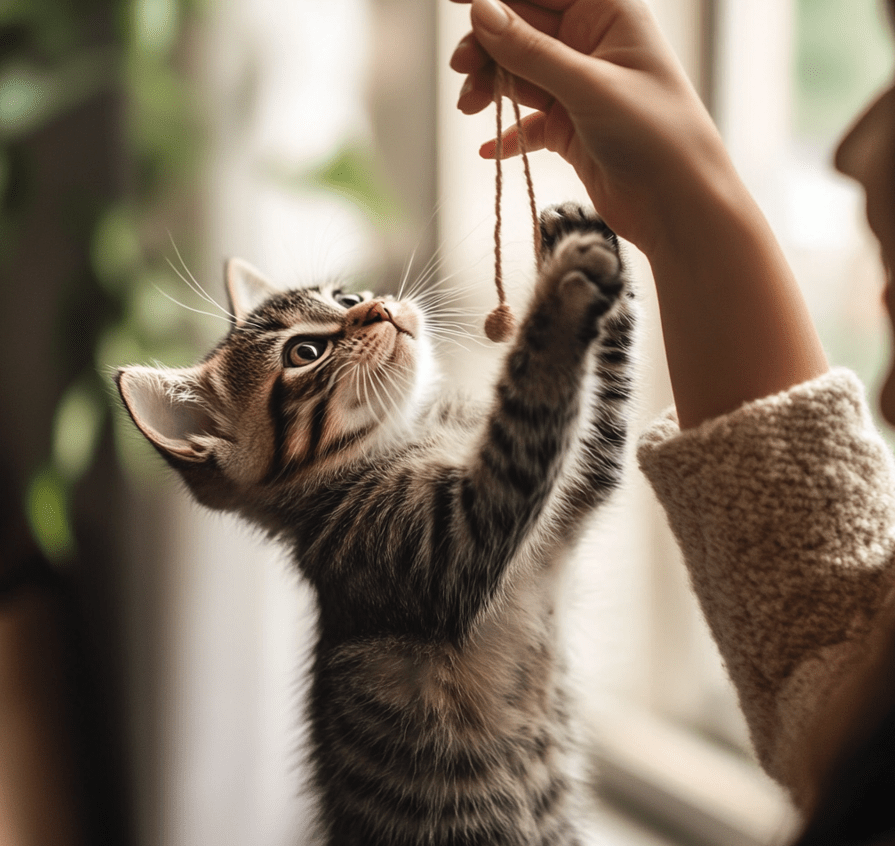
For the sake of your cat, it is important that you establish a regular routine. Connect with your kitten over 10 to 15 minute play sessions, two to three times each day which will not only create a stronger bond between you and your kitten but will also help release any pent-up energy that could result in overly aggressive behaviors.
It’s important you teach your kitten how to play gently with you. This is part of the relationship. Also, be sure to teach them not to bite or scratch while playing. Eventually, by always positively reinforcing good play habits and disregarding bad behaviors your kitten will learn to act in the right way.
6.Stop Reinforcing Unwanted Biting and Scratching
While it is often very tempting to interact with a cat after biting or scratching in any way, providing attention when he is doing these things indirectly reinforces the behavior. Your cat could turn to biting or scratching in order to get your attention. Instead, whenever these undesired behaviors manifest, ignoring your cat and stop engaging immediately becomes paramount.
7.Ensure Your Cat’s Health
If your cat is biting and scratching regularly out of the norm or seems uncharacteristically aggressive, please make an appointment with your vet to rule out any possible health problems. Cats can become more aggressive due to pain or illness, which may put them into a defensive mode.
8.Create a Calm Environment
When a kitten is feeling stressed or anxious, they are often reactive to the point of biting or scratching. You want to create an environment that promotes peace. Provide enough resources for each of your cats — hiding places, food and water, litter trays, scratching posts etc. Also make an effort to keep the same type of meal throughout the day and play in a regular routine, keeping noise to a minimum, as also try to avoid uncomfortable situations inside everyone’s home.

